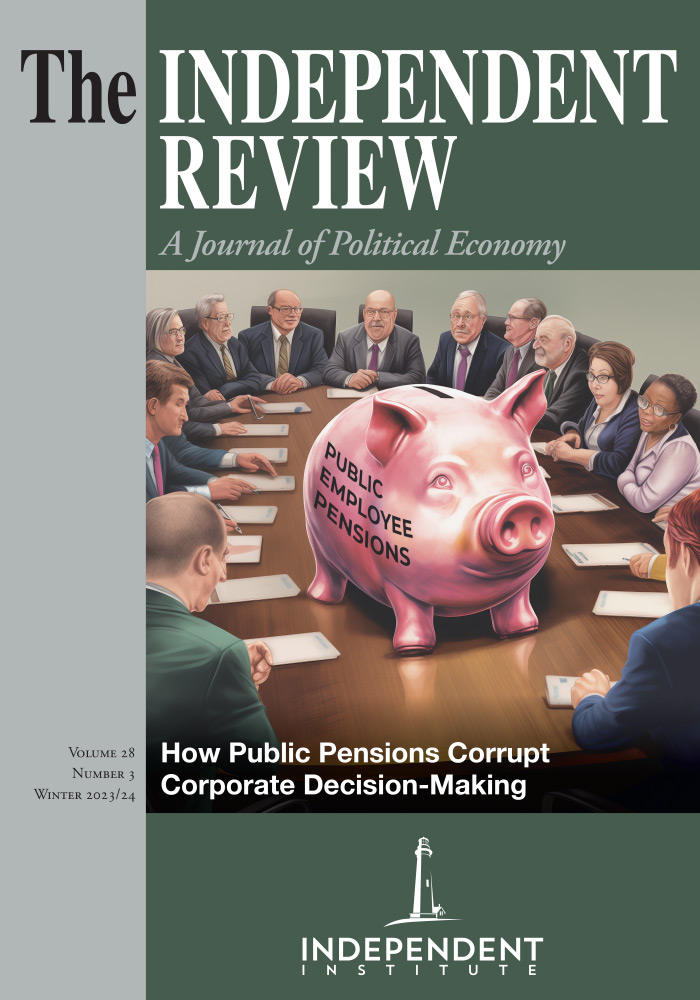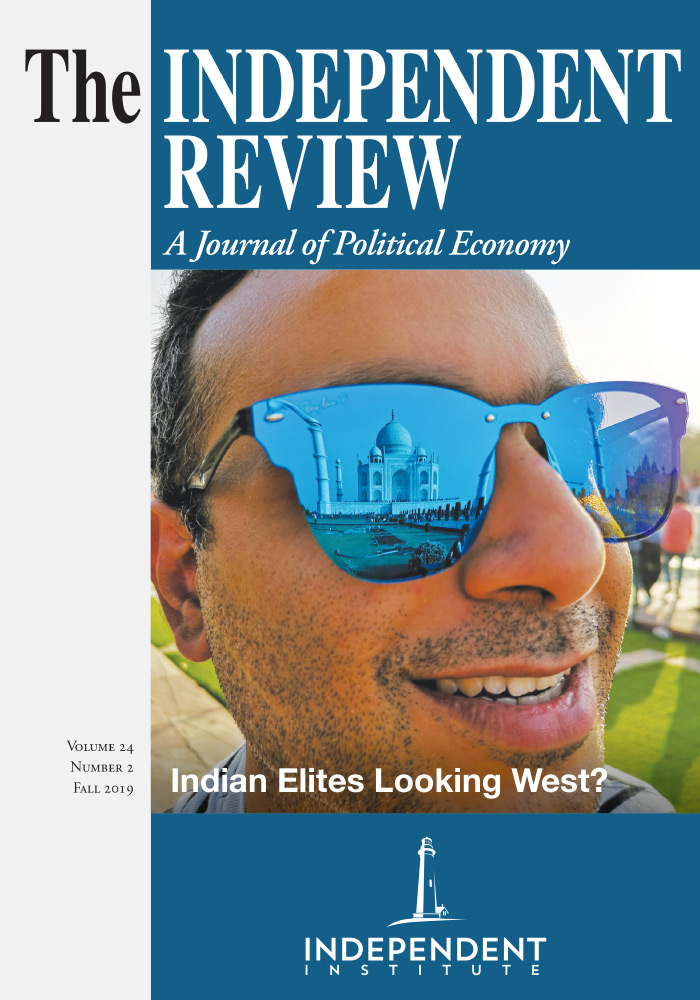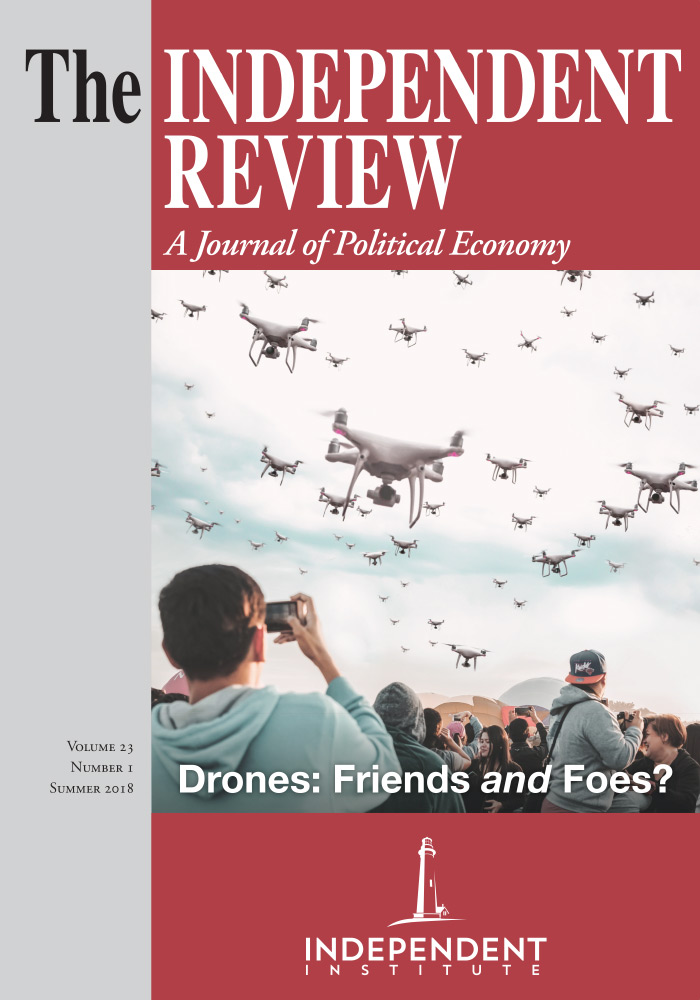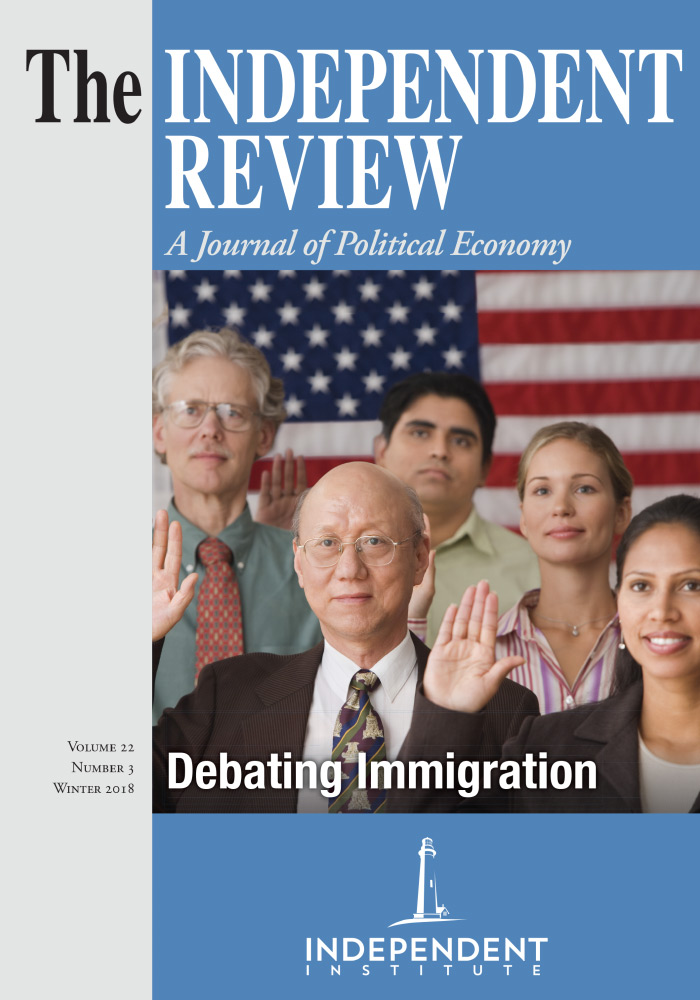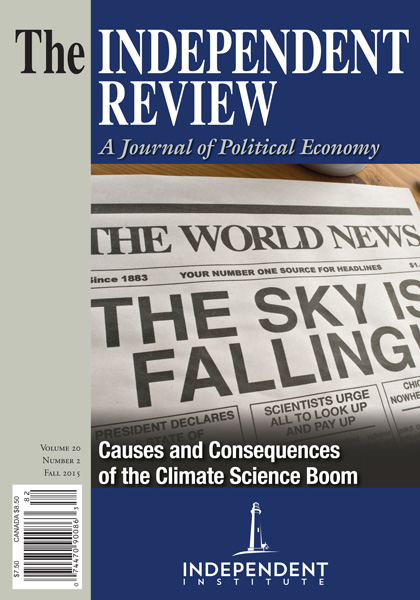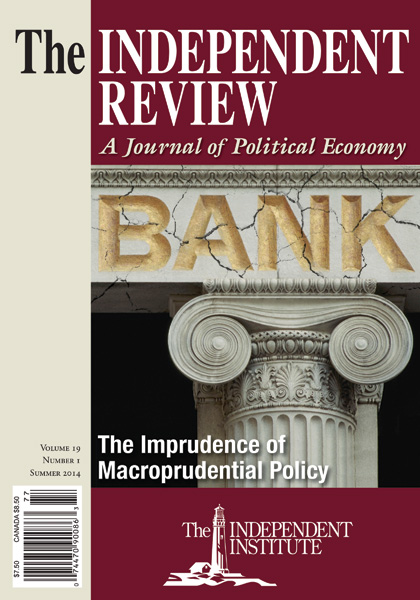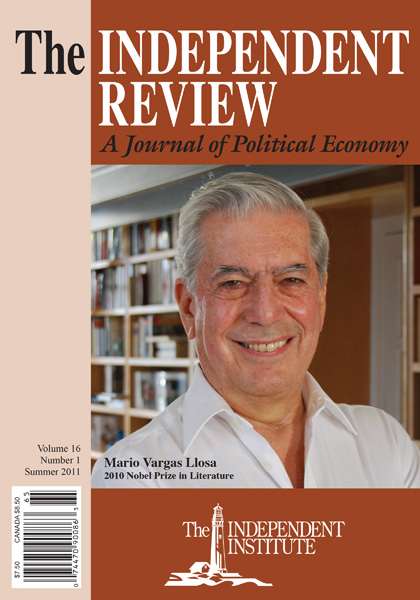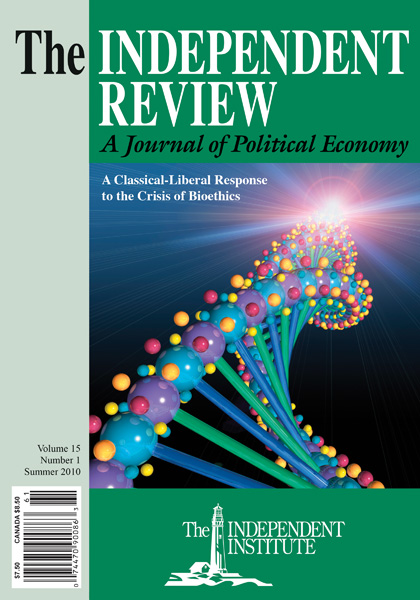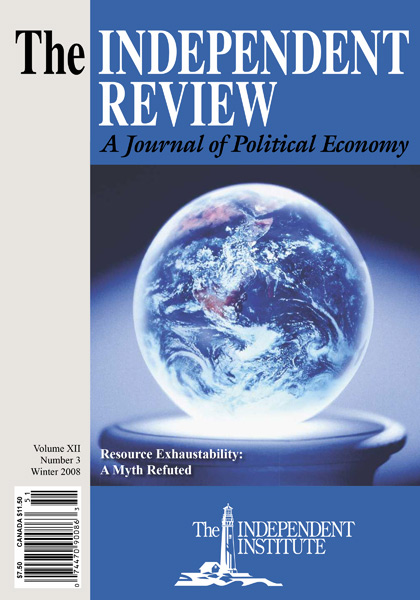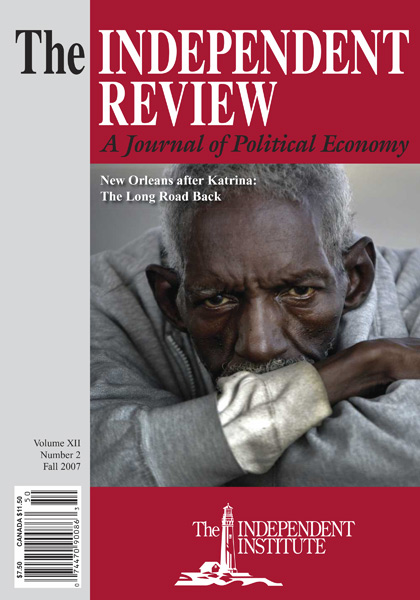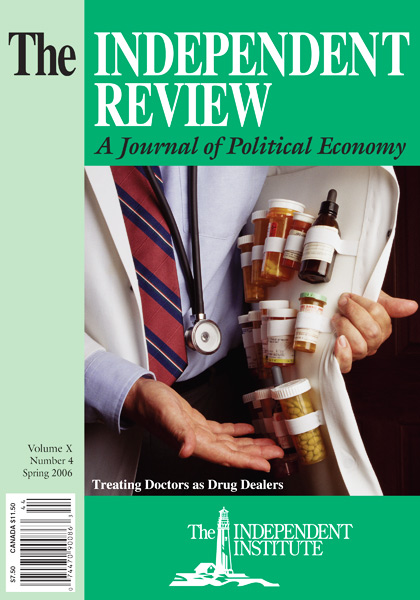Classical liberals, who aim to limit government so that the independent sector (such as clubs, churches, and associations) can flourish, have been cast out of their kingdom. The on-going classical liberal diaspora was caused by the spectacular, rapid collapse of fusionism, which tried to unite traditional conservative and libertarian ideas. Where can we go? Classical liberalism now faces an extinction-level threat, unless we can accept our differences and try to reunite around a banner of social change and an optimistic, positive vision of the future.
Article
We’ll commence with an Old Testament reading, from the “Book of the Prophet Deneen.” As Deneen (2018, xiii) put it:
Liberalism ... is understood to be the greatest possible freedom from external constraints, including customary norms. The only limitation on Liberty, in this view, should be duly enacted laws consistent with maintaining order of otherwise unfettered individuals. Liberalism thus disassembles a world of customs and replaces it with promulgated laws.
This is simply wrong, though in an interesting way. In fact, classical liberals have been cast out of their traditional kingdom, which centered limited government precisely so that the “independent sector” (clubs, churches, and associations; see Corneulle [1965] 1993) could flourish. It was this deep faith that societies could self-govern through custom, manners, and convention on their own, without coercion, that justified limitations on the state.
Why would Deneen get this so wrong, and in fact exactly backward? Well, notice that he does not say that liberalism actually relies on “promulgated laws,” but rather that “liberalism is understood” (my emphasis) to have that meaning. Thus, while Deneen’s characterization is definitionally incorrect, it may have substantial force empirically. Liberalism really is “understood” in exactly this way, by many people, and that is our own fault. Consequently, classical liberals have been complicit, if only by negligence, in the transformation of public perceptions.
My point is not to assign blame, but to offer an assessment: given that classical liberals have been cast out of their kingdom; where can they (we) go?
Diaspora: The Tribes Are Scattered
The word diaspora comes from two Greek roots: διά-(motion in all directions, all across) and σπείρω (to sow, or scatter, as with seed thrown about thoughtlessly). A common use of the word diaspora is to describe the scattering of the tribes of Israel, most clearly when Moses admonishes the Israelites in Deuteronomy chapter 4, verses 26–27 (King James Version):
I call heaven and earth to witness against you this day, that ye shall soon utterly perish from off the land whereunto ye go over Jordan to possess it; ye shall not prolong your days upon it, but shall utterly be destroyed.
And the LORD shall scatter you among the nations, and ye shall be left few in number among the heathen, whither the LORD shall lead you.
To be honest, “left few in number among the heathen” sounds pretty familiar. The tribes of classical liberalism are suffering through a diaspora of our own, scattered and separated. But it is useful to think what those tribes look like, to understand the tensions within the political coalition on the Right.
Two major visions of classical liberalism are “remnantism” and “fusionism.”
Remnantism
The perception of classical liberalism as “a remnant” derives in large measure from Albert Jay Nock’s Our Enemy, the State (1935), and especially his “Isaiah’s Job” (1936). The prophet Isaiah was told to tell the people of Israel that they should return to the correct doctrine, but he was also told that it wouldn’t do any good. The tribes would be scattered, and most would be killed. Then, in Isaiah 37:31–32 Isaiah is told:And the remnant that is escaped of the house of Judah shall again take root downward, and bear fruit upward:
For out of Jerusalem shall go forth a remnant, and they that escape out of mount Zion.
The goal of Nock’s modern classical liberal “remnant” is not to win, but to survive, to be ready when the views of the masses are redeemed, and people realize the failures of authoritarianism. In terms of more recent writing, the remnant is to function like Isaac Asimov’s “Foundation,” keeping alive the last flickering flame of truth. Nock invoked an early version of Friedrich Hayek’s “law” and “legislation,” lauding the first as being the product of wisdom, and rejecting the second as a product of mass politics. Again, this is precisely the opposite of Deneen’s characterization, but again in fairness Nock would not have disagreed that mass politics is how liberalism is “understood” by the masses. For the remnant, however, classical liberalism “wants” a limited state precisely so all social constraints that affect us are social, not legal.
Fusionism
Frank Meyer saw the potential of a coalition of two groups, the union of which would be both logically coherent and political puissant.
- The “traditionalists” stress the authority of transcendent truth; they emphasize the necessity of a political and social order in accord with the constitution of national identity.
- The “libertarians” take as their first principle in political affairs the freedom of the individual person, and emphasize the restriction of the power of the state and the maintenance of the free-market economy as guarantors of that freedom by creating countervailing centers of power.
The alliance of traditional conservatives and libertarians was once quite robust, but it seems to be coming apart. It is worth noting that this alliance is highly contingent, and has in fact never been successful in other nations or cultures (that may be why Rothbard, 1965, argued for his own version of fusionism, but with the left). Only in America were libertarian principles established, conventional, and “available” to be conserved, because no other nation had ever been founded on libertarian principles.
This contingency makes the coalition fragile, even brittle. In fact there are three different American founding myths, and they are sharply in tension:
- The Declaration of Independence (1776) asserts as its central thesis “that all men are created equal.” This equality is a legal fiction because it is equality before the law. There is no reason to expect that we are in fact equally tall, or strong, or fast, or good at solving math problems. As a direct and intentional consequence, one key birthright of every person is their own pursuit of hap piness, through full, autonomous ownership of their own happiness as an individual, very much as distinct from the good of the nation, or any larger organic group. The existence of the nation derives from the desire, and the right, of the individual to make autonomous use of their own property for their own ends. It is here that “fusionism” has its strongest and most durable foundation.
- For paleoconservatives the most important founding document is the Articles of Confederation (1781); and the most important part of the articles is the clear compact among the states as the source and basis of sovereignty. “The United States in Congress assembled” is not awkward language, repeated for no real purpose, but instead the entire constituted entity, a nation that has duties and obligations of its own, and individuals are much less important. The cultural DNA of a Christian nation of Europeans is what is to be “conserved.” Natcons never had any special truck with the “all created equal” folks. A deservedly obscure book that has recently achieved a renaissance among natcons is Kendall and Carey’s Basic Symbols (1995). Those authors argue that “all created equal” means that Americans, like the citizens of England, France, or other European nations, have the right to create a nation that fulfills the potential of our greatness. And of course “greatness” implies, and in fact requires, a European and Christian citizenry.
- For traditional conservatives—if any below the age of fifty still exist—the most important founding document is the Constitution (1787), which has a conception of political authority based on individual sovereignty, employing contractarian logic to empower a central government with specifically limited and enumerated powers, further restricted by the citizen and state privileges and responsibilities listed in the Bill of Rights (1791).
For the “New Right” in the U.S., the Constitution and Bill of Rights were once a (marginally) useful fiction, if that. In any case, that fight is over. At this point, the Constitution should simply be abandoned, and we should begin anew. As Christopher DeMuth (2021) notes, in a piece sympathetic to the impulse of natcon activism, “National conservatives hold a variety of views about our predecessors in 20thcentury conservatism, neoconservatism, libertarianism and constitutional originalism.” But natcons, in their most aggressive form, claim “that those isms accomplished nothing and only set the scene for our current shambles,” according to DeMuth.
Diaspora
With this outline now in place, it is clear that the “classical liberal diaspora” was caused by the spectacular, and rapid, collapse of “fusionism.” Patrick Deneen and other natcons are reacting to what they see as the failure of fusionism, which they perceive (perhaps rightly) as having been fraught and artificial from the beginning. There are certainly authors who are far more sympathetic to fusionism—Adler (2004), Doherty (2008), and Slade (2021), among others—who see it as having cracked and broken into fragments in the past decade.
Meyer’s justification for fusion is the claim that American-style conservatism has a dual mandate to preserve both liberty and virtue. Trading off between them is an impoverishment of the ideals of the American founding and, indeed, by this account at least, a rejection of the ideals of Western civilization itself. On the other hand, if one must choose, virtue is the more essential value. If liberty must be sacrificed to conserve virtue, that is a price well worth paying, for the new conservatives.
That kind of “Why not both?” sense of priority is a recipe for tension, at best. Conservatives are more likely to hold to some notion of virtue, based on cultural tradition, the application of right reason, or revelation of the sacred, and if virtue requires coercion, so be it. Libertarians are more likely to hold to some notion of virtue as being defined by the individual and for the individual, so that values start with my own beliefs, and your beliefs, and any disagreement can never be a basis for coercion or force.
The Frank Meyer synthesis favoring fusionism claimed (and possibly still does, though maybe not) that the two notions of virtue and liberty cannot be separated, because they are symbiotically dependent. Faith, to be salvatory, must be authentic, and therefore voluntary. This is hardly a new idea; in The Spirit of the Laws Montesquieu ([1750] 1989) had the same idea:
It is true that, in democracies, the people seem to act as they please; but political liberty does not consist in an unlimited freedom. In governments, that is, in societies directed by laws, liberty can consist only in the power of doing what we ought to will, and in not being constrained to do what we ought not to will. (Book 11, chap. 3)
How to square this (correct, I think) definition with Deneen’s (incorrect, but not inaccurate) one? Remember, Deneen claimed that liberalism implies seeking “the greatest possible freedom from external constraints, including customary norms.” The merit (and there is considerable merit) in Deneen’s claim that this is liberalism is understood to derive from an empirical fact: Classical liberals as a whole have simply failed to offer a compelling moral case that the greatest possible freedom carries with it the responsibility to do what “we ought to will.”
The result is that we have grown materially rich, but we are culturally impoverished. Those who want more of a cultural embeddedness do not look to classical liberals for a solution, because we have been complacent about the mechanical creation of prosperity as if that were all there is. The problem can be seen also, and perhaps even more starkly, in Chile. Chile has by far the highest standard of living in South America but has seen increases in inequality. Classical liberals in Chile have been incredulous that the poor aren’t more grateful to the system that has brought them prosperity. It turns out that saying “but look how rich you are becoming!” is persuasive only until you get rich. As nations become prosperous, they can afford to become more concerned about inequality, and are more easily seduced by silver-tongued demagogues who weave vaporous spells of “justice.”
Classical Liberalism and the Second Best
Classical liberals face yet another problem. In the phrase of Thomas Sowell (1987), classical liberals have—must have—a “constrained vision.” We all imagine how much good we could do, and quickly, if we could just grasp the reins of power. The difficulty is that a state powerful enough to do what you want is also powerful enough to take everything you have. If the state is empowered to establish one religion, or one set of cultural norms, privileging it above alternatives, then some entity or group must have the power to exercise that elevation, that privileging.
But then the struggle to control that entity, and name those norms, or establish that religion, will tear society apart. Hundreds of years of bloody European history have taught that the only alternative that is sustainable is to put the power to establish norms and morals beyond the power of the state. My own claim is that the argument for limited government can be stated simply: never build a sword so powerful that you don’t want to see it wielded by your worst enemy after the next election. Because it will be, and much sooner than you think!
I had expected that the election of Donald Trump would be a watershed moment for my friends on the Left. My argument was always hypothetical: What if a giant scary orange man became president? Aren’t you worried that the enormous concentration of power in the president, in explicit violation of the Constitution, will result in tyranny?
And, to be fair, on November 10 and 11 in 2016 two different leftist friends of mine at Duke came into my office, shut the door carefully, and then said: “So, I was reading the Federalist Papers, and there’s some good [stuff] in there.”
I smiled, and answered, “Yes, there is. And that good stuff was in there a month ago, and a year ago, when Obama was still president.”
My friends immediately bristled: “Oh, but I wasn’t worried then. It was OK as long as our side was in power.”
Um ... gosh. That completely misses the point. The argument for liberalism is that you can’t be sure that your side will win, and even if it does, it will certainly not win forever. You have to understand that there are two different things: (1) power and (2) control of that power. If you concentrate power, you sow the wind; when you lose control of the power the whirlwind that follows reaps you.
That was not the lesson that the Left took in 2017. Nor has it been the lesson that the Right took in 2021. In fact, a disturbing proportion of activists on both sides agree on one important matter: It is time to abandon the Constitution, because that battle is already lost. The only remaining strategy is to gain power, and keep it, regardless of the cost and regardless of the tactics required. One can appear to justify almost any tactic in war, even if the justification is not valid.
Everyone hopes—and some seem to believe—their side will win, and can win forever. Once they (whoever “they” are) get in power, and enforce cultural conformity, whether that be with wokeness, or Christian orthodoxy, or racial purity, the battles will be over. Society will be peaceful, and culture will be remade in the vision of (whoever you are talking to). When I attend meetings of the Philadelphia Society, for example, I meet many young people who have no classical liberal commitments at all, and in fact who consider liberalism in all its forms, including classical liberalism, to be the enemy.
So, classical liberals are “scattered across,” in a new political diaspora. Not scattered across space, but across ideological commitments. I have many “libertarian” friends who have gone over entirely to Trump, and others to the Democrats. Still others have adopted a “Don’t vote, it only encourages them” posture, where the isolated remnant revels and splashes about in its well-deserved irrelevance.
Now What?
To close, my final question is this: now what? Fusionism seems dead (though my friend and Independent Review coeditor Gregory Robson has just finished a new book on reviving fusionism, so stay tuned!). American conservatives are no longer committed to “conserving” the Constitution, and in fact they agree with the Left that it should be scrapped. Bizarrely, religious and cultural groups think that they can win, and win forever. The arguments for classical liberalism seem tepid, settling for “second best,” fettered by a “constrained vision” rather than calling forth the faithful to a new and glorious crusade.
The problem with any diaspora is that the scattered people become more concerned with symbol, and ritual, than with substance. Preserving the identity becomes a substitute for pursuing goals, or trying to return to the promised land. Scattered tribes who are actually very similar will emphasize their differences because such is the only remaining source of identity. I worry that classical liberalism faces an extinction-level threat, unless we can accept our differences and try to reunite around a banner of social change and an optimistic, positive vision of the future.
But again, this is not a new problem. As Hayek wrote in the concluding paragraphs of his essay “The Intellectuals and Socialism” (1949):
We must make the building of a free society once more an intellectual adventure, a deed of courage. What we lack is a liberal Utopia, a program which seems neither a mere defense of things as they are nor a diluted kind of socialism, but a truly liberal radicalism. We need intellectual leaders who are willing to work for an ideal, however small may be the prospects of its early realization.
Free trade and freedom of opportunity are ideals which still may arouse the imaginations of large numbers, but a mere “reasonable freedom of trade” or a mere “relaxation of controls” is neither intellectually respectable nor likely to inspire any enthusiasm.
I imagine that when Hayek wrote those words in 1949 he did not anticipate the powerful and broad-based renaissance of classical liberalism that much of the world saw in the 1970s, ’80s, and ’90s. In fact, the prospects for a return to the promised land were even darker in 1949 than today. Today we have resources, and people, and organizations that can yet be recruited to the “intellectual adventure” we all want to be a part of. Classical liberalism can be revived, and restored. Because there is really no viable alternative.
References
Adler, Jonathan H. 2004. Frank Meyer: The Fusionist as Federalist. Publius: The Journal of Federalism 34, no. 4 (Fall): 51–67.
Cornuelle, Richard. (1965) 1993. Reclaiming the American Dream: The Role of Private Individuals and Voluntary Associations. New Brunswick, N.J.: Transaction Publishers.
DeMuth, Christopher. 2021. Why America Needs National Conservatism. Wall Street Journal, November 12, 2021.
Deneen, Patrick. 2018. Why Liberalism Failed. New Haven, Conn.: Yale University Press.
Doherty, Brian. 2008. Radicals for Capitalism: A Freewheeling History of the Modern American Libertarian Movement. New York: PublicAffairs Books.
Hayek, F. A. 1949. The Intellectuals and Socialism. University of Chicago Law Review 16 (3): 417–433.
Kendall, Willmoore, and George W. Carey. 1995. The Basic Symbols of the American Political Tradition. Washington: Catholic University of America Press.
Montesquieu, Baron de (Charles de Secondat). (1750) 1989. Spirit of the Laws. English edition. New York: Cambridge University Press.
Nock, Albert Jay. 1935. Our Enemy, the State. New York: William Morrow and Company.
———. 1936. Isaiah’s Job. The Atlantic, June 1936.
Rothbard, Murray. 1965. Left and Right: The Prospects for Liberty. Left and Right, Spring 1965, pp. 4–22
Slade, Stephanie. 2021. Is There a Future for Fusionism? Reason, March 2021.
Sowell, Thomas. 1987. A Conflict of Visions: Ideological Origins of Political Struggles. New York: Morrow
---
This paper is adapted from the keynote address delivered at the Classical Liberals of the Carolinas conference, August 4, 2023, in Asheville, North Carolina.
Acknowledgments: The author acknowledges the help of Edward Lopez, John Allison, and the Classical Liberals of the Carolinas organization for arranging the forum where this talk was presented, and also the useful comments of Gregory Robson, coeditor of The Independent Review.
| Other Independent Review articles by Michael C. Munger | ||
| Summer 2024 | Secret Government: The Pathologies of Publicity | |
| Spring 2024 | Following Their Leaders: Political Preferences and Public Policy | |
| Spring 2024 | The Origins and Evolution of Consumer Capitalism; Crack-Up Capitalism | |
| [View All (80)] | ||

